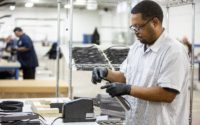UAE’s Comprehensive Food Security Strategy Swiftly Navigating Unprecedented Pressures Of Pandemic, Say Experts
“The outbreak of Covid-19 and the consequent supply chain disruptions in food imports has served as a wake-up call for countries largely reliant on food imports, and is driving a renewed interest in increasing self-sufficiency through deployment of modern farm tech solutions to boost locally grown produce,” said Mohamed Al Musharrkh, CEO of Sharjah FDI Office (Invest in Sharjah), while moderating a webinar recently titled ‘Future technologies for agriculture 4.0 and the role of governments’.
Organised by Invest in Sharjah, an affiliate of the Sharjah Investment and Development Authority (Shurooq), the virtual discussion hosted pioneers and experts in the agricultural sector in the UAE including Dr. Ghanem Al Hajri – Partner and CEO of Themar Al Emarat, a Sharjah-based state-of-the-art facility with six-tonne capacity of fresh produce per day; Dr. Mohamed Ali Mechraoui – Associate Partner DinarStandard, a research and advisory firm; and Mr. Hemant Julka – Co-Founder and COO of Veggitech, an agro-technology start up that is disrupting three key areas that pose challenges to traditional farming in the UAE – soil, temperature and water.
“In the UAE, food security is a national priority, and long-term food security and self-sufficiency are key strategic goals for the government,” said Musharrkh. “The establishment of a dedicated Ministry of Food Security further attests to its focus on strategic, sustainable, and forward-thinking policies. As a nation dependent on food imports, it was the committed efforts taken over years to bolster its resilience to supply shocks that helped the UAEsuccessfully tackle the disruptions caused by the onset of the pandemic.”
The webinar addressed the role of governments in addressing the food security issue and how they can drive goal-oriented programmes to drive better outcomes for all stakeholders. It also looked at the role of innovative technologies in boosting productivity levels and making farms more efficient, commercially viable and sustainable.
Dr. Ghanem Al Hajri noted that the UAE’s market size for fresh produce is AED 16 billion, and the sector continues to grow at a rate of 9.93 per cent annually. “The UAE is the largest consumer market after Saudi Arabia and imports more than 80 percent of its fresh food. Naturally, there is massive market potential for expansion and growth in this sector.”
He added: “Leveraging technology is the way forward to scale up production, safeguard natural resources, and attract more investors into this field. Several government interventions to support farmers through subsidies on utilities and infrastructural capabilities are driving demand for fresh produce today. However, strong regulatory frameworks and quality certification for local produce will keep the doors open for more players to come into the market and develop better sustainable farming production standards across the UAE while also leading to positive multiplier effects in the economy.”
Agriculture emerged as one of the most vulnerable sectors with the outbreak of the pandemic, serving as a catalyst for nations to produce more of what it consumes, asserted Dr. Mohamed Ali Mechraoui.
Agri tech is helping countries become self-sufficient, he said, adding how the UAE’s investments in vertical farming, hydroponics, and R&D have helped it navigate the recent crisis. “Governments should act as an enabler of the agricultural ecosystem with targeted initiatives and create a positive environment for players. The global food crisis should be looked upon as an opportunity, not a threat. And for this, they need to offer financial incentives, regulatory flexibility, provide infrastructure at affordable prices, and encourage technology innovation to increase yield.”
Such a targeted goal-oriented effort approach calls for planned growth, and increased collaborations in the form of PPPs and R&D activities, he added. “Agriculture in the UAE is a promising sector and the focus should be on its three main pillars – costs, availability and quality.”
It was the business-friendly environment of Sharjah and the ease of doing business here that drew Veggitech to the emirate, said Hemant Julka, CEO. “The agro-tech business is a networked economy, and to create a positive environment for growth, it is vital to raise awareness amongst consumers about the importance of buying local food while retailers should be incentivised to stock more of local produce as against imported items,” he said.
“The vibrant university ecosystem in Sharjah and the presence of the Sharjah Research, Technology and Innovation Park is allowing us to involve academia to further drive interest in the sector,” he added. “Our Innovation Labs allow students to gain better understanding of the technology we bring to the region. We believe that students are our future leaders, and if we want to be a food secure nation, students have to be part of that story.”
‘Invest in Sharjah’ is committed to highlight Sharjah’s business-friendly environment and attractive investment opportunities in all local and international forums. Since its inception by Sharjah Investment and Development Authority (Shurooq) during the Sharjah FDI Forum in September 2016, the Office brings together local and international investors, guiding them to the tremendous opportunities and potential that Sharjah offers. The Office’s efforts contribute to cement the emirate’s position as a leading investment destination regionally and globally.









